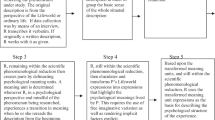Abstract
In this paper, a Wittgensteinian account of the human sciences is constructed around the notions of the surface of human life and of surface phenomena as expressions. I begin by explaining Wittgenstein's idea that the goal of interpretive social science is to make actions and practices seem natural. I then explicate his notions of the surface of life and of surface phenomena as expressions by reviewing his analysis of mental state language. Finally, I critically examine three ideas: (a) that the goal of interpretive inquiry is realized through a descriptive, context-constructing method that enables investigators to grasp the instincts, mental states, and experiences (“Geist”) expressed in surface phenomena; (b) that uncovering rules plays a minor role in this enterprise; and (c) that surface phenomena not only can be made natural but also have causes and are subject to causal explanation.
Similar content being viewed by others
References
Apel, Karl-Otto: 1967, Analytic Philosophy of Action and the Geisteswissenschaften, D. Reidel, Dordrect.
Bloor, David: 1983, Wittgenstein: A Social Theory of Knowledge, Columbia University Press, New York.
Cioffi, Frank: 1981, ‘Wittgenstein and the Fire-Festivals’, in Irving Block (ed.), Perspectives on the Philosophy of Wittgenstein, MIT Press, Cambridge.
Finch, Henry Le Roy: 1977, Wittgenstein — The Later Philosophy, Humanities Press, Atlantic Highlands, NJ.
Hintikka, Jaakko: 1989, ‘Rules, Games, and Experiences: Wittgenstein's Discussion of Rule-Following in the Light of his Development’, Revue Internationale de Philosophie 43(2), 279–97.
Kerr, Fergus: 1986, Theology after Wittgenstein, Blackwell, Oxford.
Mannheim, Karl: 1971, ‘Conservative Thought’, in Kurt Wolf (ed.), From Karl Mannheim, Oxford University Press, New York.
McDowell, John: 1984, ‘Wittgenstein on Following a Rule’, Synthese 58, 325–63.
Nyiri, J.: 1976, ‘Wittgenstein's New Traditionalism’, in Essays on Wittgenstein in Honour of G. H. von Wright, Acta Philosophica Fennica 28 (1–3), 503–12.
Nyiri, J.: 1982, ‘Wittgenstein's Later Work in Relation to Conservatism’, in B. McGuinness (ed.), Wittgenstein and his Times, Blackwell, Oxford, pp. 44–68.
Rosen, Michael: 1983, ‘Critical Theory: Between Ideology and Philosophy’, in Sollace Mitchell and Michael Rosen (eds.), The Need for Interpretation, Athlone Press, London.
Runciman, W. C.: 1983, A Treatise on Social Theory, vol. 1, Cambridge University Press, Cambridge.
Spengler, Oswald: 1918, Der Untergang des Abendlandes, Wilhelm Braumuller, Wien.
Winch, Peter: 1958, The Idea of a Social Science and its Relation to Philosophy, Routledge and Kegan Paul, London.
Winch, Peter: 1977, ‘Understanding a Primitive Society’, reprinted in Fred R. Dallmayr and Thomas A. McCarthy (eds.), Understanding and Social Inquiry, University of Notre Dame Press, Notre Dame.
Wittgenstein, Ludwig: 1966, in Cyril Barrett (ed.), Lectures and Conversations on Aesthetics, Psychology, and Religious Belief, Blackwell, Oxford.
Wittgenstein, Ludwig: 1967, Philosophical Investigations, G. M. E. Anscombe (trans.), MacMillan, New York.
Wittgenstein, Ludwig: 1968, ‘Wittgenstein's Notes for Lectures on ‘Private Experience’ and ‘Sense Data’’, Philosophical Review LXXVII, 271–320.
Wittgenstein, Ludwig: 1969, The Blue and the Brown Books, Blackwell, Oxford.
Wittgenstein, Ludwig: 1970, in G. E. M. Anscombe and G. H. von Wright (eds.), Zettel, G. E. M. Anscombe (trans.), University of California Press, Berkeley.
Wittgenstein, Ludwig: 1975, in G. E. M. Anscombe and G. H. von Wright (eds.), On Certainty, Denis Paul and G. E. M. Anscombe (trans.), Blackwell, Oxford.
Wittgenstein, Ludwig: 1976, ‘Cause and Effect: Intuitive Awareness’, Peter Winch (trans.), Philosophia 6 (3–4), 409–25.
Wittgenstein, Ludwig: 1979, ‘Remarks on Frazer's Golden Bough’, in C. G. Luckhardt (ed.), Wittgenstein: Sources and Perspectives, J. Beversluis (trans.), The Harvester Press, Brighton. Originally published in Synthese 17 (1967), 233–53.
Wittgenstein, Ludwig: 1980, in G. H. von Wright and Heikki Nyman (eds.), Culture and Value, Peter Winch (trans.), University of Chicago Press, Chicago.
Wittgenstein, Ludwig: 1983, in G. H. von Wright, R. Rhees, and G. E. M. Anscombe (eds.), Remarks on the Foundations of Mathematics, G. E. M. Anscombe (trans.), MIT Press, Cambridge.
Author information
Authors and Affiliations
Rights and permissions
About this article
Cite this article
Schatzki, T.R. Elements of a Wittgensteinian philosophy of the human sciences. Synthese 87, 311–329 (1991). https://doi.org/10.1007/BF00485406
Issue Date:
DOI: https://doi.org/10.1007/BF00485406




